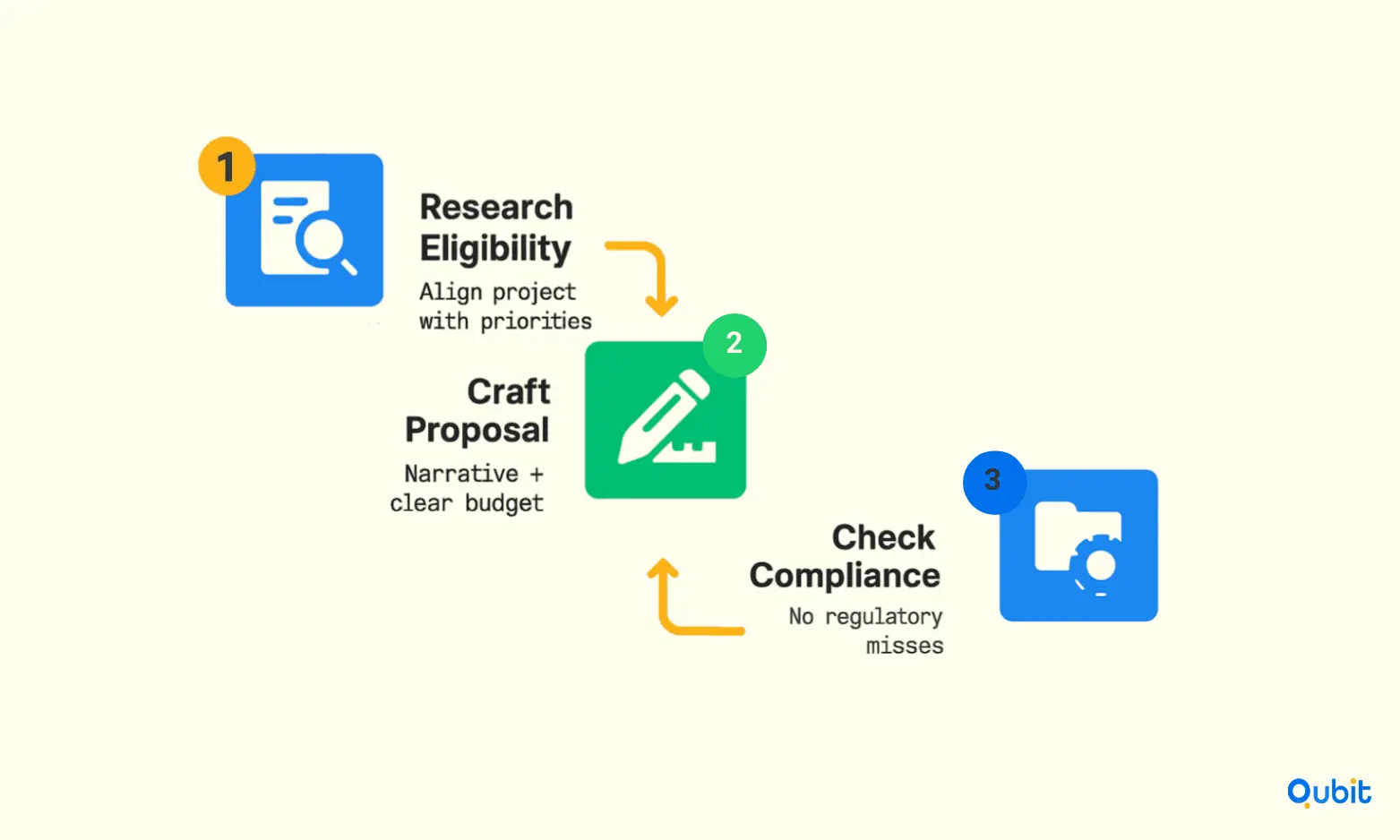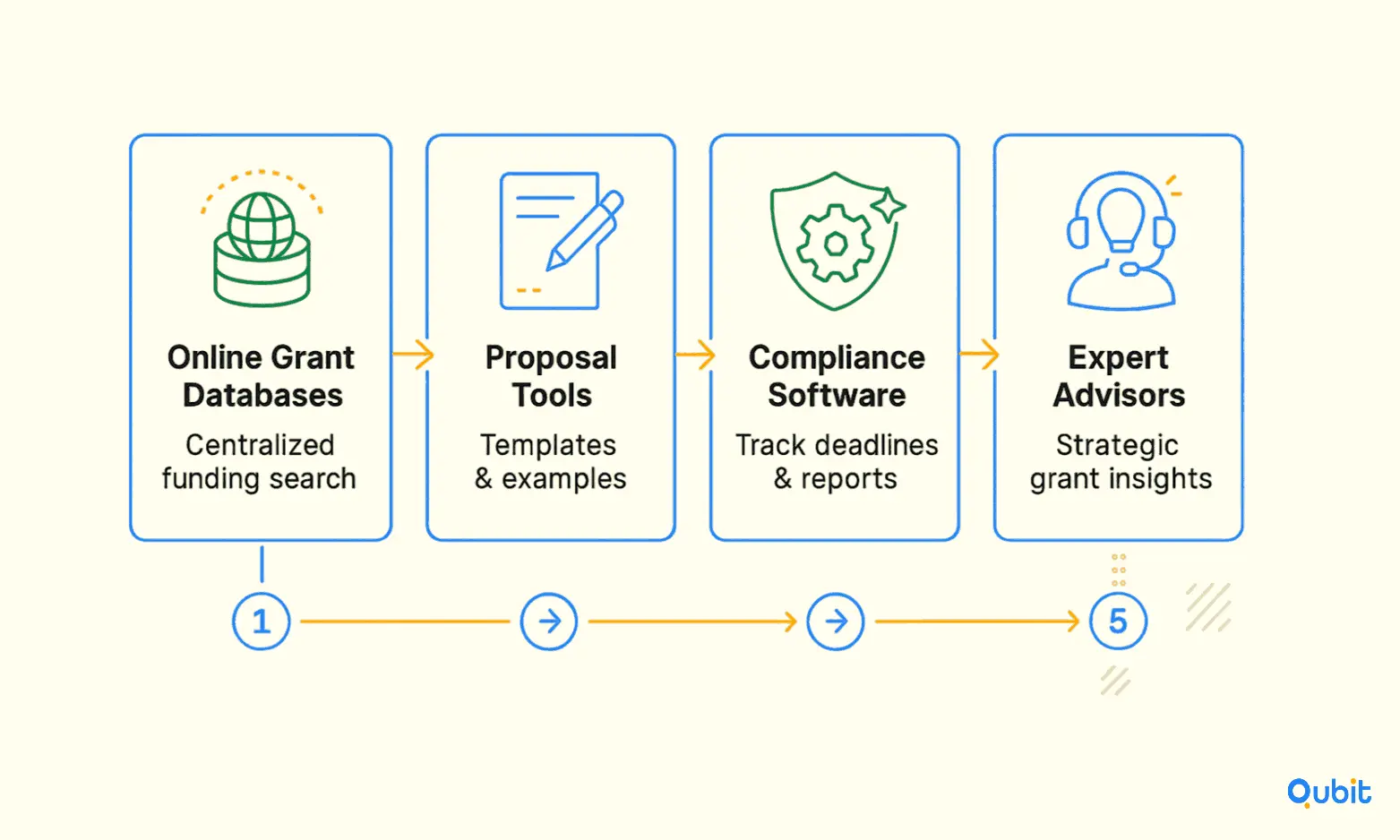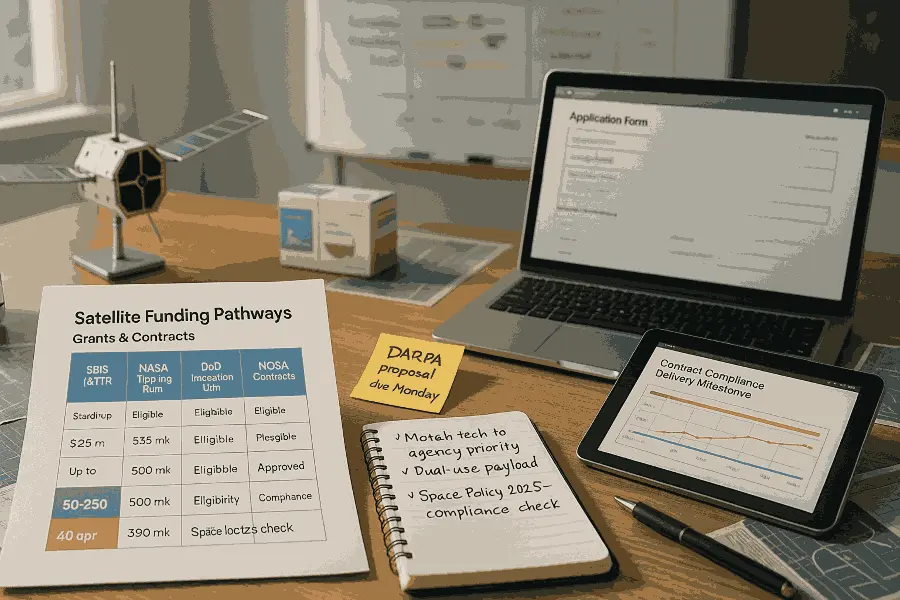Securing funding is often a critical step for satellite ventures aiming to innovate and expand. Government grants and contracts provide a unique opportunity to access substantial resources without diluting equity. These funding mechanisms are designed to support technological advancements, foster economic growth, and drive innovation in industries like aerospace. For satellite startups, understanding how to tap into these public funding opportunities can be a game-changer.
Your exploration of government grants and contracts is enriched by insights on fundraising strategies for deep tech startups, offering a broader view of the deep-tech funding landscape. By combining public funding with strategic fundraising, satellite ventures can unlock the potential to scale their operations and achieve groundbreaking results.
Understanding Government Grants: Definition, Types, and Eligibility
Government grants play a pivotal role in fostering innovation, particularly in satellite ventures. These financial awards are provided by government agencies to support projects that align with national priorities, such as advancing technology, enhancing research capabilities, or strengthening strategic partnerships. Unlike loans, grants do not require repayment, making them an attractive option for organizations aiming to scale their operations or develop groundbreaking technologies.
Types of Government Grants
Grants for satellite ventures come in various forms, each tailored to specific objectives:
Research and Development (R&D) Grants: These grants fund early-stage projects focused on technological innovation. Agencies like NASA and the European Space Agency (ESA) often provide R&D grants to accelerate advancements in satellite technology. For instance, NASA awarded 108 Phase II SBIR contracts worth up to $850,000 each in 2024, showcasing the scale of funding available for innovative projects (NASA awarded 108 Phase II SBIR contracts).
Commercialization Grants: These grants help organizations transition from research to market-ready products, ensuring that innovations reach their intended audience.
Small Business Innovation Grants: Designed for startups and small enterprises, these grants focus on fostering entrepreneurship and enabling smaller players to contribute to the satellite industry.
Eligibility Criteria
Securing a government grant requires meeting specific eligibility requirements:
- Technology Readiness Levels (TRL): Projects must demonstrate a clear understanding of their TRL stage, ensuring they align with the grant’s objectives.
- Organizational Structure: Grants often prioritize entities like research institutions, startups, or small businesses.
- National Compliance: Applicants must adhere to regulations and policies set by the granting agency, including ethical standards and reporting requirements.
Government grants not only provide financial support but also drive innovation, enabling satellite ventures to achieve milestones that might otherwise remain out of reach.
Exploring Government Contracts: Understanding Types and Key Differences
Government contracts offer a structured pathway for agencies to procure services or products, often from specialized industries like satellite ventures. These agreements are legally binding and come with stringent performance requirements, ensuring that deliverables meet predefined standards. Unlike grants, which are typically non-repayable, government contracts focus on specific outcomes and often include milestone-based payouts tied to performance metrics.
One of the defining characteristics of government contracts is their emphasis on accountability. Contractors must adhere to strict timelines and deliverables, with payments often contingent on meeting these obligations. This contrasts sharply with grants, where funds are provided upfront without the expectation of repayment. Additionally, contracts may include clauses related to intellectual property rights, often requiring the contractor to relinquish certain rights to the government.
Understanding the nuances of government contracts is crucial for businesses, especially those in niche sectors like space technology. For instance, satellite ventures often rely on these contracts to fund their operations, but they must navigate complex terms and conditions. The discussion contrasts public funding with space launch startup venture capital, which highlights how private investment channels operate alongside government grants.
Government contracts also come in various forms, such as fixed-price agreements, cost-reimbursement models, and indefinite-delivery systems. Each type serves a specific purpose, catering to different project scopes and risk levels. By understanding these distinctions, businesses can better position themselves to secure and fulfill these contracts effectively.
Application Process for Grants and Contracts: A Step-by-Step Guide
Securing government grants and contracts for satellite-focused projects requires a structured approach. This guide outlines the essential steps to simplify the application process while addressing common challenges like documentation overload.

1. Start with Research and Eligibility Assessment
Begin by identifying grant opportunities that align with your project goals. Carefully review eligibility criteria to ensure your proposal meets the requirements. Government grants often have specific focus areas, so tailoring your application to match these priorities is crucial.
2. Develop a Robust Proposal
Crafting a compelling proposal is the cornerstone of a successful application. Include a detailed project narrative that clearly outlines objectives, methodologies, and expected outcomes. Pair this with a comprehensive budget justification that demonstrates financial feasibility and transparency.
3. Master Bidding Best Practices
For government contracts, competitive bidding is key. Focus on presenting a clear value proposition that highlights your expertise and cost-effectiveness. Avoid generic responses by customizing your bid to address the specific needs of the contract issuer.
4. Conduct Compliance Checks
Ensure your application adheres to all regulatory and legal requirements. Missing compliance details can lead to disqualification, so double-check documentation, certifications, and submission formats.
5. Streamline Documentation Processes
One common hurdle is managing extensive paperwork. To overcome this, create a centralized system for organizing documents and templates. This approach saves time and reduces errors during submission.
For additional insights on how strategic collaborations can complement government funding approaches, explore aerospace partnership funding for space startups. These partnerships can help streamline complex application processes and mitigate risks.
By following these steps, you’ll be better equipped to navigate the complexities of applying for government grants and contracts, ensuring your satellite-focused project has the best chance of success.
Funding Opportunities for Satellite Ventures: Exploring Grants and Contracts
Securing funding is a critical step for satellite ventures aiming to innovate and scale. With a variety of funding opportunities available, startups can tap into resources from federal, state, and international entities to support their research and deployment efforts. The global space economy, valued at $570 billion in 2023, with 78% stemming from commercial revenues, highlights the immense potential for satellite projects to thrive in this expanding market.
Federal and State Grants for Satellite Projects
Government grants are a cornerstone for satellite R&D. In the U.S., programs like NASA’s Small Business Innovation Research (SBIR) and Small Business Technology Transfer (STTR) provide funding for early-stage research. Similarly, the Department of Defense (DoD) offers contracts through its Defense Innovation Unit (DIU) for dual-use technologies, including satellite systems. State-level initiatives, such as California’s Space Grant Consortium, also provide localized funding to foster innovation.
International Funding Programs
Globally, satellite ventures can benefit from initiatives like the European Space Agency’s (ESA) Business Incubation Centres (BICs), which support startups with grants and technical expertise. In 2023 alone, European space startups raised €942 million across 78 deals, demonstrating the region’s robust funding ecosystem.
Identifying the Right Funding Path
Startups must evaluate their goals to determine the most suitable funding model. While grants often support R&D, government contracts are tailored for deployment and operational needs. For those exploring alternative methods, the review of government funding options is further deepened by examining crowdfunding smallsat missions, which presents an alternative method of securing capital for your satellite ventures.
By understanding these diverse funding streams, satellite ventures can position themselves for long-term success in a competitive industry.
Success Stories and Case Studies: Real-World Funding Achievements
Securing government grants and contracts has propelled numerous satellite ventures toward groundbreaking achievements. These real-world examples highlight how strategic alignment with government priorities can unlock substantial funding opportunities.
Starfish Space’s Otter: Orbital Debris Inspection Mission
Starfish Space’s Otter spacecraft exemplifies how targeted research and development can align with government objectives to secure significant funding. Awarded a $15 million NASA SBIR Phase III contract, this mission is set to launch in 2026. The project focuses on orbital debris inspection, addressing a critical challenge in space sustainability. This case demonstrates the importance of tailoring innovations to meet specific government needs, paving the way for substantial financial backing.
BioFabrication Facility: In-Space Manufacturing Development
The BioFabrication Facility, developed by Techshot/Redwire, showcases a multi-phase approach to securing government funding. After progressing through several SBIR phases, the project earned a $1.5 million NASA CCRPP award. This initiative focuses on advancing in-space manufacturing technologies, demonstrating how persistence and phased development can lead to significant financial support. Such strategies highlight the value of compliance and long-term partnership formation in achieving funding success.
For a broader understanding of how government grants interplay with funding strategies for space-tech startups, explore our insights on space tech startup funding strategies.
These examples underline the importance of aligning disruptive technologies with government priorities, forming strategic partnerships, and adhering to compliance standards to secure funding.
Trends in Government Funding for Satellite Ventures: Policy and Technological Shifts
Public investment in satellite ventures has undergone significant transformation, driven by evolving policies and technological advancements. Government funding now plays a pivotal role in shaping the trajectory of space startups and defense-related projects.
Expanding Public Co-Investment Opportunities
Governments are increasingly participating directly in funding rounds for space startups. This increased public co-investment in space startups not only reduces the financial risks for private investors but also accelerates the growth of emerging companies. Collaborative funding models, which attract both government and private capital, are becoming a cornerstone of this trend. By sharing the financial burden, these initiatives foster innovation and encourage private sector participation in high-risk, high-reward satellite ventures.
Growth in Defense-Driven Budgets
Global defense space budgets have seen a notable rise, with a 12% increase recorded in 2024. This surge creates new funding opportunities for dual-use satellite technologies that cater to both civilian and military applications. Defense-driven investments often prioritize projects with strategic importance, such as advanced communication systems and surveillance satellites. As a result, satellite ventures focusing on defense applications are well-positioned to secure expanded government contracts.
Policy Shifts and Their Impact
Policy changes can significantly influence the availability of grants and contracts. While supportive policies can accelerate funding accessibility, restrictive measures may hinder growth. For instance, streamlined regulatory frameworks and tax incentives can attract more private-public partnerships, whereas overly stringent policies might deter innovation.
Understanding these trends is essential for stakeholders aiming to capitalize on the evolving funding landscape. As governments continue to adapt their strategies, satellite ventures must remain agile to align with these shifts.
Tools and Resources for Satellite Ventures: Enhancing Your Funding Strategy
Securing funding for satellite ventures can be a complex process, but the right tools and resources can simplify it significantly. From identifying grant opportunities to managing compliance, these solutions are designed to optimize every step of your funding strategy.

1. Online Grant Databases
Platforms like Grants.gov and the European Space Agency’s funding portal offer centralized access to government grants and contracts. These databases allow satellite ventures to filter opportunities by region, industry, and funding type, saving valuable time during the search process. Regularly updating your search criteria ensures you stay informed about the latest opportunities.
2. Proposal Preparation Tools
Crafting a compelling funding application requires precision. Tools such as GrantStation and Foundation Directory Online provide templates, examples, and guidelines tailored to the needs of satellite ventures. These resources streamline the writing process, ensuring your proposals meet the specific requirements of funding bodies.
3. Compliance Management Software
Staying compliant with grant and contract regulations is critical. Software like GovWin IQ and Deltek Costpoint helps ventures track deadlines, monitor spending, and generate reports. These tools reduce the risk of errors, ensuring your project remains on track and within legal boundaries.
4. Expert Consultation Services
For ventures tackling complex funding applications, expert consultation services can be invaluable. Specialists in satellite funding can review your proposals, provide strategic advice, and increase your chances of securing grants. Their insights often make the difference between a successful application and a missed opportunity.
By integrating these tools and resources into your funding strategy, satellite ventures can streamline their processes and focus on innovation.
Conclusion
Understanding the distinctions between grants and contracts is essential for organizations aiming to secure government funding. Throughout this article, we’ve explored key strategies and insights that highlight the importance of tailoring your funding narrative to align with government priorities. A well-crafted proposal not only demonstrates your project’s value but also builds trust with decision-makers, increasing your chances of success.
Taking the next step in your funding journey requires preparation and expertise. Whether you’re pursuing grants or contracts, having the right guidance can make all the difference. At Qubit Capital, our Fundraising Assistance service is designed to help you identify and secure the most suitable funding opportunities with confidence.
Let us help you turn your vision into reality. Reach out today to explore how we can support your goals.
Key Takeaways
- Government grants and contracts offer vital funding avenues for satellite ventures.
- Understanding the distinct differences between grants and contracts is crucial.
- A structured application process can help overcome common challenges in securing funding.
- Real-world case studies provide actionable insights and strategies for success.
- Staying updated on funding trends and leveraging the right tools enhances your funding strategy.
Frequently asked Questions
What government grants are available for satellite startups?
Various grants are designed to support satellite startups, including those for research and development (R&D), commercialization, and small business innovation. Agencies such as NASA and the European Space Agency (ESA) often provide these grants to foster advancements in space technology.


 Back
Back



